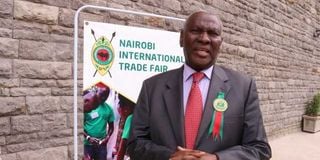What to expect at Nairobi Trade Fair

Joseph Mugo, the Chairman Agricultural Society of Kenya (ASK) Nairobi Branch.
Nairobi International Trade Fair, organised by the Agricultural Society of Kenya (ASK), will be at Jamhuri Park from September 23 to 29. Joseph Mugo, the Nairobi ASK Chairman, talked to Seeds of Gold writer Sammy Waweru.
How is this year’s Nairobi International Trade Fair different from previous ones?
This year’s will be the 123rd edition of the fair, themed “Promoting Climate-Smart Agriculture and Trade Initiatives for Sustainable Economic Growth.”
The 2024 edition will feature an expanded range of exhibitors, including new participants such as the International Organisation for Migration (IOM), the Lamu Port South Sudan-Ethiopia Transport (Lapsset) Corridor Development Authority and CFAO Group, all showcasing innovations in farming, trade and sustainability.
We also expect more than 300 exhibitors from at least 10 countries, including Pakistan, Argentina, Mozambique, Malawi and Tanzania. This will truly be a global experience.
What programmes have been implemented through the fair to promote farming innovations and encourage the adoption of new technology by Kenyan farmers?
The ASK Show has made strides in promoting agricultural innovations. Key initiatives include the establishment of business incubation centres for micro, small, and medium enterprises (MSMEs) and providing training on the latest technology.
Additionally, the demonstration gardens at Jamhuri Park offer year-round training for farmers on climate-smart agriculture, helping them adopt sustainable practices.
Are there specific innovations or programmes to be showcased at this year’s fair that address challenges faced by livestock farmers?
This year’s event will highlight innovations addressing the challenges faced by livestock farmers. These include dairy goat breeds and breeding, focusing on selecting high-yield goat breeds to enhance productivity.
There will also be housing and feeding technology designed to improve goat housing and nutrition for better milk production.
Moreover, showgoers and farmers will be shown marketing strategies for indigenous chickens, offering techniques to boost market access and income for farmers, alongside advanced methods of disease prevention and management in poultry.
These initiatives address core concerns for livestock farmers, such as productivity, disease management and market access.
How does the trade fair advocate for and support sustainable agricultural practices?
The show strongly advocates sustainability, in line with its theme of promoting climate-smart agriculture.
The fair has embraced green initiatives such as solar lighting, solar-powered water systems and environmentally friendly farming technology.
Through workshops and exhibitions, farmers are encouraged to adopt these sustainable practices, reducing their environmental impact while enhancing productivity.
Highlight key partnerships or collaborations ASK has formed with local and international stakeholders to boost agriculture.
ASK has established important partnerships with local and international organisations to promote the growth of agriculture.
These include exhibitor participation from WWF Kenya, the Kenya Marine and Fisheries Research Institute and global agencies like the IOM.
These partnerships help Kenyan farmers access new technology, funding and training, thus enhancing productivity and expanding market reach.
What steps have been taken by ASK and other agriculture stakeholder to help farmers become more resilient to the devastating effects of climate change and other environmental challenges?
The show has implemented several measures to help farmers build resilience against the effects of global warming.
Important programmes include the introduction of climate-smart technology such as drought-resistant seeds and solar-powered irrigation systems, showcased in the gardens at Jamhuri Park.
The society has also initiated aquaculture projects, including the release of 200,000 tilapia fingerlings into the Jamhuri Park dam, promoting sustainable water usage and enhancing food security.
How does the fair contribute to Kenya’s food security, particularly in the context of a growing population and changing climate?
The show promotes innovations that increase yields and resilience. Initiatives such as the Young Farmers and 4K Clubs engage young people in sustainable farming practices, hence encouraging the next generation to adopt climate-smart technology and contribute to national food production.
How does the ASK Trade Fair contribute to Kenya’s overall economic development, especially in rural areas?
The international event plays an important role in Kenya’s economic development, particularly in rural areas, by providing smallholder farmers and MSMEs access to markets, training and innovation.
Exhibitions and business incubation centres allow farmers to showcase their products, network with key stakeholders and access new markets.
This fosters job creation, knowledge exchange and improved livelihoods for rural communities.
What measures has the fair put in place to assist smallholder farmers improve yields and access local and international markets?
In collaboration with the Ministry of Agriculture and Livestock Development, the ASK has provided smallholder farmers with affordable exhibition spaces at the trade fair.
These spaces enable farmers to showcase their products, interact with potential buyers and access local and international markets.
The business incubation centres also offer essential training in new farming technology, thus helping to enhance productivity and expand market reach.
As an international event held in Nairobi, the country’s capital, have previous editions made notable contributions towards advocating for greener cities?
The Nairobi International Trade Fair has consistently promoted the use of clean energy and eco-friendly practices in line with its theme of climate-smart agriculture.
Through solar lighting, water conservation initiatives and sustainable urban development projects, the show has significantly contributed to advocating for greener cities and environmental sustainability.
How will the show encourage youth participation in agriculture, and what technology will be on display to attract young entrepreneurs in agribusiness?
The organisers have made concerted effort to encourage youth participation by integrating MSMEs into the Fair, with a focus on agricultural innovations that appeal to young entrepreneurs.
The showcased technology includes smart farming tools, digital platforms for agriculture and renewable energy solutions.
These innovations not only create new business opportunities but also inspire young people to explore agribusiness.
What are some of the future objectives of the Nairobi International Trade Fair, and how do you envision its growth in the next five to 10 years?
The future of the Nairobi International Trade Fair is being shaped by ASK’s Integrated Mixed Land Use Masterplan, which aims to transform Jamhuri Park into a year-round exhibition, conferencing and recreation hub.
In the coming decade, the trade fair organisers hope it will expand its reach by attracting more international exhibitors, promote sustainable farming practices and support MSMEs through business incubation.
The development of the Jamhuri Park Exposition and Conference Centre, along with improved infrastructure and retail spaces, will position the Nairobi International Trade Fair as a premier global hub for farming innovations.





